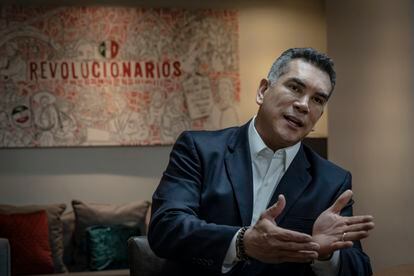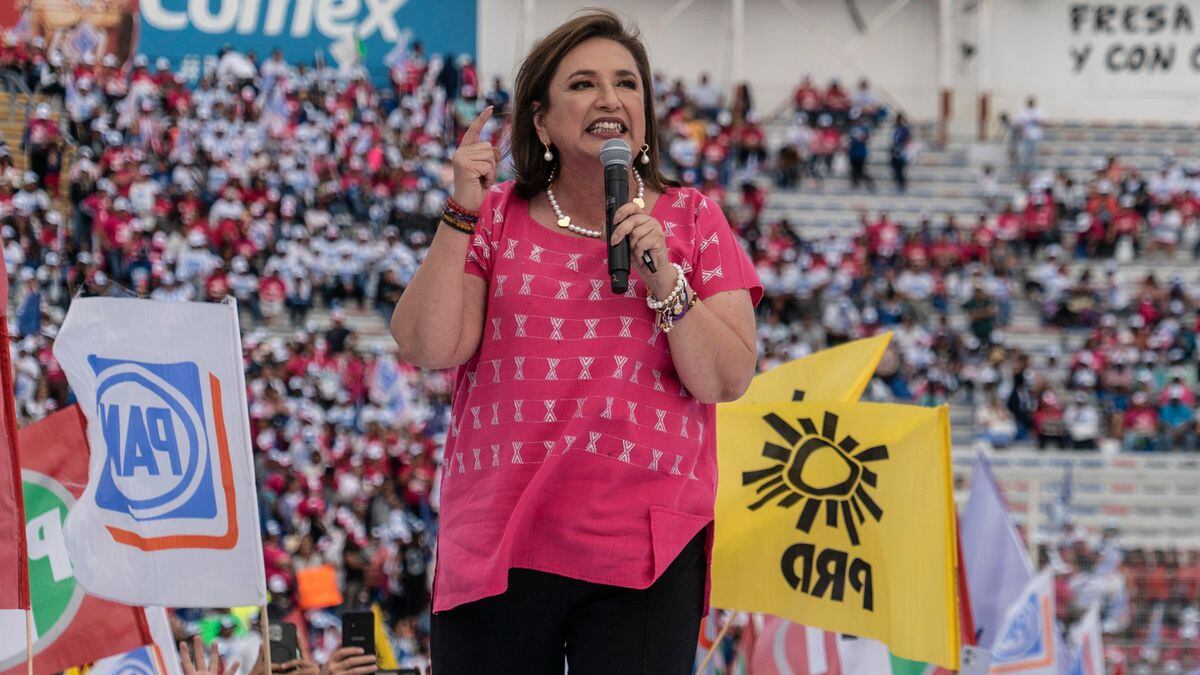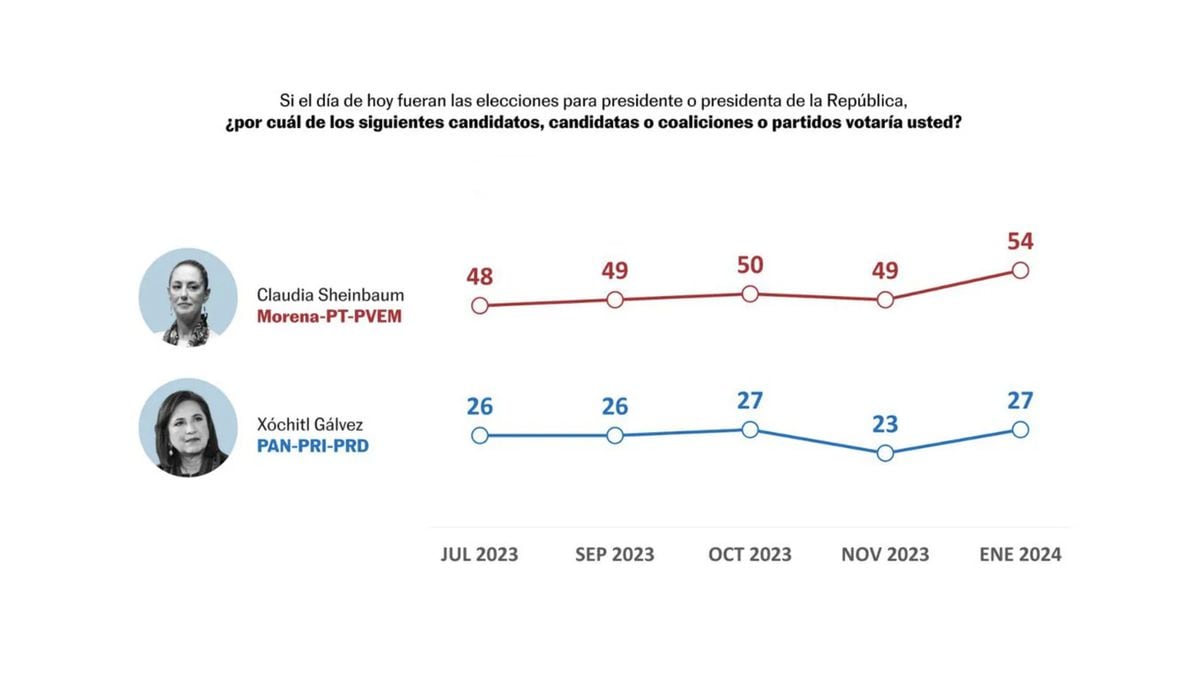Alejandro Moreno Cárdenas, National President of the PRI, in an interview for EL PAÍS, at the party's headquarters, in Mexico City. Nayeli Cruz
At the back of the meeting room is a mural.
There is the peasant and the worker.
Also a family and a doctor.
Militants with flags, highways and windmills.
In the center it says "revolutionaries" written in red capitals.
It is the motto of the PRI of Alejandro Moreno (Campeche, 46 years old), who also appears in the mural.
When he became president, in 2019, he launched the new slogan to appeal to the hard core of the historic Mexican party and at the same time deviate a little from the classic acronyms after the trail of corruption cases associated with the Government of Enrique Peña Nieto.
Added to the electoral debacle of 2018 – they lost almost 10 million votes – was the disbandment of cadres towards Morena and the defeat in eight states last year.
More displaced from power than ever, Moreno is also responsible for the unusual alliance with the PAN, his main antagonist, with whom he will stand again in the state elections in June.
From the party's headquarters, with the mural of "revolutionaries" on his back, Moreno defends the new normality of the PRI and, above all, the strength that its pivotal role in parliament gives it: "Without our votes, the Government will not no constitutional reform can pass.”
Ask.
How does the party face the June elections?
Answer
.
Of the six entities, of which we are a coalition in four, it is marked that we are ahead in four and in one there is high competition.
In the other two the challenge is greater.
Each political party is working on its own while the federal government does not give one.
Morena is a tragedy and a disgrace for this country.
P.
In November, the president of Morena said that they were going to “disappear the PRI” by taking away the four states where they still govern.
R.
We have an institutional dialogue with the Government.
I think that Morena is far from behaving like a party that lives up to the circumstances in Mexico.
Its national leader is very minor, very rupestre.
They can say that they win the elections and that they are very strong.
But without our votes no constitutional reform can pass.
P.
At what point is now precisely the negotiation of the electrical reform?
R.
The PRI will always be at the side of the defense of the environment, the promotion of clean energy, support for the 2030 Agenda, climate change, that there are better rates, that there is competition, that employment is generated and certainty in the investment, that the responsibility that Mexico has with international companies be guaranteed.
If these issues are addressed, we will always be there to pay and build.
Today there is discussion, but there is no solid proposal from the Government on the table.
When there is, we will discuss it and we will analyze it.
And any reform will be after the elections.
Q.
Are you negotiating as a block with the PAN?
R.
We are working on strengthening the legislative coalition.
The only way for it to pass is that there is an agreement with the PAN, PRI and PRD, that we all agree.
Last year's initiative will have to have modifications.
P.
So, rule out that the PRI can only vote in favor and not the PAN.
A.
It depends on what modifications you want to present there.
Perhaps the PAN can systematically say no to everything.
If there are things that can be presented in a reform that guarantees everything I told you, the PRI is willing.
P.
Isn't it a bit contradictory to be willing to change, just nine years after one of the star reforms of Peña Nieto's PRI?
R.
As a legislator, I had to vote for the reform in 2013. But every law can be perfected and improved.
So we can't say no to everything.
What we want is for there to be technical information, discussion, for the businessmen, the academy, everyone to be present.
This is what we achieve with open parliaments.
Alejandro Moreno Cárdenas poses for a portrait in his office.Nayeli Cruz
Q.
Aren't you afraid of the electoral cost of simultaneously maintaining a strong opposition to Morena and then supporting them in the Chamber?
The PRI has already voted, for example, in favor of the National Guard.
R.
I am responsible for the game from August 2019 until
that we got here
But we are not a systematic no to everything.
The PRI is not a recalcitrant, rebellious opposition that says no to everything.
People are fed up with polarization.
We are an institutional opposition, although we do not share the vision of the Government.
P.
After losing eight governorships and the unusual alliance with the PAN, do you consider that the PRI is going through the most delicate moment in its history?
R.
I would tell you that it is not an easy moment.
But when we arrived in 2019, when we had just lost the presidency, we reached single digits in the public polls.
Today the PRI is a party that is between 18 and 20 points, just like the PAN.
The coalition with PAN and PRD is almost practically at 40 points.
It is a coalition that can compete and win the presidency, the governorships.
We are a party that is growing.
We went from 16% in votes to 18% in 2021. That is the reality, although many do not like to admit it.
P.
Outside or inside the game?
R.
Outside and inside.
Look, we are a party that was born in power and is designed to govern.
And, obviously, by not having a President of the Republic, we no longer have that axis.
So we have to learn to organize ourselves.
I am the first president of the PRI who wins his election for the first time in an open consultation.
I got close to two million votes, I won in the 32 states.
That gives me strength and certainty, but we have great challenges ahead.
But, let it be clear, without us, the Government of the Republic cannot carry out any reform.
P.
In the last national assembly they declared themselves as social democrats.
A new identity apart from the time of Peña Nieto and the corruption cases?
R.
We recognize our mistakes, but those who fail are the people, not the institutions.
Those who break the law and commit acts of corruption have a name and surname.
We must recognize the mistakes, but the PRI is a progressive center-left party.
They accused us during the last Administration of being a right-wing government.
They said that we were ideologically lost.
We emphasize that we inserted ourselves into social democracy because we believe so, because that is what the majority of our PRI militancy decided.
Q.
With this twist, is there also an intention to take distance from Morena's ideological and symbolic field?
R.
They are looking to grab clients from electoral politics through social programs.
You don't compete with that ideologically.
You can't compete with resources, with nerve, with officials campaigning.
It is unfortunate for the country.
P.
Are you concerned about the transfer that is taking place, not of the electoral base, but of PRI cadres to Morena?
Four Morena candidates for those elections are former PRI members.
R.
The best of the PRI is in the PRI.
To all those who invited, it seemed more like a prize or a recognition of what they did.
In the states that the PRI lost, the governorships were handed over.
Those who lost are those who were invited to the diplomatic service.
It doesn't harm us in the slightest.
Q.
Aren't you worried that Morena ends up gobbling up the PRI?
R.
They are above the PRI and above all.
They are on figures, but we are with the people and the people are abandoning them every day.
They want to talk about candidates instead of solving the country's issues.
Q.
If anyone was told four years ago that the PRI was going to pass a coalition with the PAN, it would seem impossible to believe.
R.
It was an extraordinary decision.
P.
That pragmatism is also the PRI, right?
R.
We lived in an extraordinary situation, but the objective of a political party is to win elections, gain power to serve the people and earn their trust.
It was clear that with the measurements in 2021 alone, each political party was not competitive separately.
But the coalition was powerful.
So powerful that it not only gave us an important advance for each party, but also prevented Morena from having a qualified majority in Congress.
We had to put ideological issues aside because the objective was electoral competition.
P.
Last year there were strong altercations between militants at the gates of this headquarters.
There was even a gunshot wound.
Do you feel questioned your leadership within the party?
R.
I am totally open to everyone being heard in the party, but at the end of the day majorities are built.
So, those who did that here were criminals, barbarians.
But the good thing is that they are already in their procedure and the Justice Commission will have to make its decision.
Q.
Before, the PRI's dirty laundry was always washed at home.
Isn't that another sign of decay?
R.
Mexico changed, the correlation of forces changed.
But today we have the opportunity to promote a game.
In the last legislature we had 10 young people under 40 years of age in the Chamber.
Today we have 25 young people.
The technical secretary of the National Political Council, which is a very important function in the PRI, is 31 years old.
subscribe here
to the
newsletter
of EL PAÍS México and receive all the informative keys of the current affairs of this country




/cloudfront-eu-central-1.images.arcpublishing.com/prisa/GNE3LQFGRVCODPOHCRBEVT7PYE.jpg)




